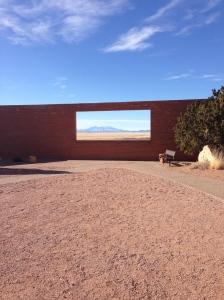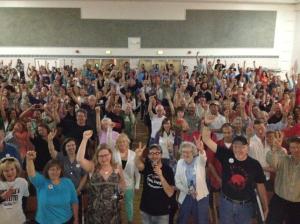
A glimps into the future or past at Meteor Crator Arizona (just off the old-Route 66). Copyright © 2013 Mason Hayutin
The energy debate America is having is surely making a difference. The latest technology in exploration from Space to abandoned oil fields and vast non-productive Prairies is allowing each of us to answer the questions:
At what price are we willing to trade one way of life for another?
At what price will citizens dependent on their Automobile be willing to switch from “dirty” fuels to “clean” alternatives?
My concern with these questions became formalized as I participated in the fine art documentary film, LUBIE LOVE – The Movie. Hard to believe that the release was 4 years ago at New York’s Tribeca Cinema. In that short amount of time, Apple and Samsung have relegated the desktop computer to a near death along with the slow-to-adapt Blackberry. Next year, nearly 123 Million users will be watching – consuming TV and digital content on “SmartTVs.” With just a click of the keypad, mouse, smartphone or remote, an independent film like LUBIE LOVE can be watched and reviewed 123 Million times! (Review your copy here).
Yesterday, in my home state of Colorado, three Colorado communities voted to let more facts on Fracking be known. They voted on extending a moratorium on hyrdrolic fracturing by as much as 5 more years. Boulder, Layfette and Fort Collins chose to say “No” for now. They also chose to embrace a “clean environment” where drinking water is likely to be one of the Front Range’s biggest obstacles to sustained growth.
Credit can be given to my contemporary in film, Josh Fox. He successfully galvanized a national awareness of drinking water being so polluted by “careless” exploration techniques that one could easily light it on fire. His first movie Gasland exposed the problem found by a Weld County, Colorado resident. I can only wonder how much of that problem was pre-existing vs. caused by the actual fracturing of a nearby natural gas well? Methane escaping from the ground happens naturally.
And credit can also be given to T. Boone Pickens and the Pickens Plan. In 2009, Boone beat me to the CNBC’s Englewood Cliff’s, New Jersey studios to announce a vision for America’s energy future. Harnessed by the wind, and a big bet on Natural Gas, Pickens thrust the political debate to be about getting off foreign oil. Unlike the SmartTV, the Pickens Plan has approximately 2 million active users/followers.
Compare that to approximately 350 Million Americans. At age 16, each of us – at least in Colorado, has a right to drive. A right that fuels us forward for generations. And when the keys are finally turned over in our elder years, we are only left with a memory of what it was like to drive. Boone, according to the Houston Chronicle, is one elder whose memory will include being able to say he had a Natural Gas powered Cadillac in the 1990s!
Obviously driving has enabled a global community to advance. The future though, as has already been proven, is not strapped to just one way getting from point A to point B. The path is dependent on providing economically sustainable alternatives. These alternatives must produce an economic base that enables each of us to live as we choose. Today, companies like FedEx and UPS are increasing their profits by relying on natural gas powered delivery vehicles.
In the same breadth, the economic future of rural and non-rural communities is being put to test by the ethics and practices used to produce natural gas. To frack or not! The decision is not black and white.
Josh, like others, were faced with profiting from an “Amazing” gold rush in the form of land and mineral right sales that could allow their future to be forever financed. As one oil industry executive conveyed to me by phone yesterday – “I’m receiving royalties from wells that were drilled in 1931. Almost 100 years later the well is still productive. And I am happy it is mine.”
The freedom of choice by the American consumer (compared to those by politicians) is perhaps our greatest achievement as a society. When we wake up we can decide to earn a living so we may buy anything available in the open market. Of course that’s where choice battles are fought and won – from harmoniously produced music to poorly made vehicles. The definition of success for all of these goods and services are measured in one simple way – profit.
Tags: Alternative Energy, CNBC, Colorado Energy Debate, Festivals, Fracking, Gasland, Independent Film, Natural Gas, Pickens Plan




